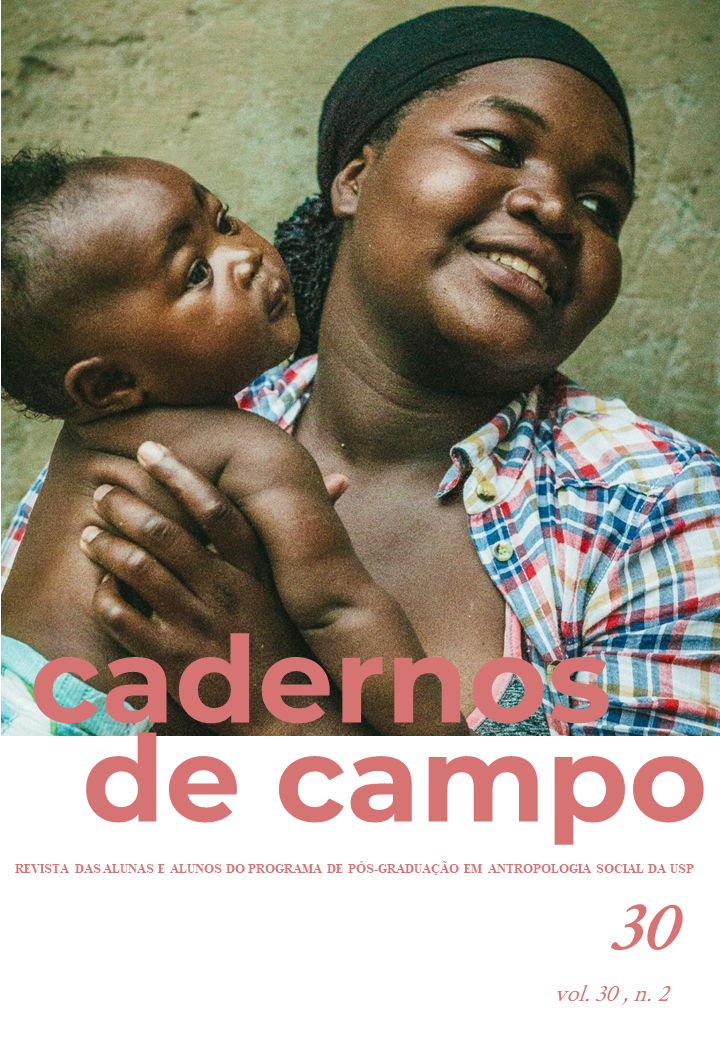Nangui tereka, hablando duro en la vida política de las mujeres Waorani
DOI:
https://doi.org/10.11606/issn.2316-9133.v30i2pe193463Keywords:
Speak hearshly, Female lidearship, Amazon, WaoraniAbstract
This article explores the participation of the Waorani women of the Ecuadorian Amazon, in what they recognize as political life. In communities located near oil roads, this notion refers to meetings and negotiations with Others. Local political life, in these communities, is an expression of Waorani resistance that is different, although complementary, to the great anti-extractive demonstrations that have attracted the attention of public opinion and researchers. The article contributes to Amazonian leadership studies by exploring a discourse called nangui tereka (speaking harshly), an art perfected by various Waorani women. Talking harshly is a way of expressing strength or courage (piñe, pienguimamo), which is cultivated throughout life through a series of intergenerational bodily practices.
Downloads
References
Alès, C. (2003). Función simbólica y organización social. Discursos rituales y política entre los Yanomami. In C. Alès & J. Chiappino (Eds.), Caminos Cruzados. Ensayos en Antropología Social, Etnoecología y Etnoeducación (pp. 197–240). IRD Editions.
Århem, K. (2000). From Longhouse to Village: Structure and Change in the Colombian Amazon. In K. Århem (Ed.), Ethnographic puzzles : essays on social organization, symbolism and change /Kaj Århem. (pp. 55–92). London : Athlone.
Bravo Díaz, A. (2020). Notas Amazónicas frente a la pandemia, el caso Waorani en Ecuador. Revista Periferia, 25(2). https://doi.org/https://doi.org/10.5565/rev/periferia.742
Bravo Díaz, A. (2021). “Sumak kawsay Is Harmful for All of Us” Oil Roads and Well-being among the Waorani in Ecuadorian Amazonia. Latin American Perspectives, 48(3), 51–68.
Brightman, M. (2007). Amerindian Leadership in Guianese Amazonia. Doctoral dissertation, Cambridge: Cambridge University.
Brightman, M. (2016). The imbalance of power : leadership, masculinity and wealth in the Amazon. New York : Berghahn.
Clastres, P. (1987). Society against the state : essays in political anthropology (R. Hurley & A. Stein (eds.)). Zone Books.
Conklin, B. (1997). Body paint, feathers, and VCRs: Aesthetics and authenticity in Amazonian activism. American Ethnologist, 24(4), 711–737.
Gallois, D. (2002). “Nossas falas duras”. Discurso político e auto-representação Waiãpi. In B. Albert & A. Ramos (Eds.), Pacificando o branco: cosmologias do contato no norteamazônico (pp. 205–237). Editora UNESP.
Guzmán-Gallegos, M. (2015). Amazonian Kichwa Leadership:: The Circulation of Wealth and the Ambiguities of Mediation (F. Santos-Granero (ed.)). University of Arizona Press.
High, C. (2007). Oil development, indigenous organisations, and the politics of egalitarianism. Cambridge Anthropology, 26(2), 34–46.
High, C. (2010). Warriors, hunters, and Bruce Lee: Gendered agency and the transformation of Amazonian masculinity. American Ethnologist, 37(4), 753–770. https://doi.org/10.1111/j.1548-1425.2010.01283.x
High, C. (2018). Bodies that speak: Languages of differentiation and becoming in Amazonia. Language and Communication, 63, 65–75. https://doi.org/10.1016/j.langcom.2018.02.005
Lévi-Strauss, C. (1944). The Social and Psychological Aspect of Chieftainship in a Primitive Tribe: the Nambikuara of Northwestern Mato Grosso. York, Transactions of the New Academy of Science, 7, 16–32.
Nahum-Claudel, C. (2018). Vital diplomacy : the ritual everyday on a dammed river in Amazonia / by Chloe Nahum-Claudel. New York .
Narváez, R., & Trujillo, P. (2020). Tiempos de guerra y tiempos de paz continuum simbólico de un pueblo de reciente contacto el caso etnográfico de los waorani en la amazonía ecuatoriana. Cadernos de Campo, 29(1), 13–37. https://doi.org/10.11606/issn.2316-9133.v29i1p13-37
Overing, J., & Passes, A. (2000). Introduction. In J. Overing & A. Passes (Eds.), The Anthropology of Love and Anger : The Aesthetics of Conviviality in Native Amazonia (pp. 1–30). Routledge.
Passes, A. (2004). The place of politics: powerful speech and women speakers in everyday Pa’ikwené (Palikur) life. The Journal of the Royal Anthropological Institute, 10(1), 1–18. https://doi.org/10.1111/j.1467-9655.2004.00177.x
Rival, L. (2002). Trekking through history : the Huaorani of Amazonian Ecuador. Columbia University Press.
Rival, L. (2005). The attachment of the soul to the body among the Huaorani of Amazonian Ecuador. Ethnos, 70(3), 285–310. https://doi.org/10.1080/00141840500294300
Sempértegui, A. (2019). Indigenous Women’s Activism, Ecofeminism, and Extractivism: Partial Connections in the Ecuadorian Amazon. Politics and Gender, . https://doi.org/10.1017/S1743923X19000023
Sempértegui, A. (2020). Decolonizing the Anti-Extractive Struggle: Amazonian Women’s Practices of Forest-Making in Ecuador. Journal of International Women’s Studies, 21(7), 118–134.
Uzendoski, M. A. (2018). Amazonia and the cultural politics of extractivism: Sumak Kawsay and Block 20 of Ecuador. Cultural Studies, 32(3), 364–388. https://doi.org/10.1080/09502386.2017.1420095
Vallejo, I., & García-Torres, M. (2017). Mujeres indígenas y neo-extractivismo petrolero en la Amazonía centro del Ecuador: Reflexiones sobre ecologías y ontologías políticas en articulación. Brújula (Enfoques), 11(1), 1–43.
Viveiros de Castro, E. (1996). Images of Nature and Society in Amazonian Ethnology. Annual Review of Anthropology, 25(1), 179–200. https://doi.org/10.1146/annurev.anthro.25.1.179
Zanotti, L. (2012). Resistance and the politics of negotiation: women, place and space among the Kayapó in Amazonia, Brazil. Gender, Place & Culture: A Journal of Feminist Geography, 20(3), 346–362.
Downloads
Published
Issue
Section
License
Copyright (c) 2021 Cadernos de Campo (São Paulo, 1991)

This work is licensed under a Creative Commons Attribution-NonCommercial-ShareAlike 4.0 International License.
I authorize Cadernos de Campo Journal of Anthropology to publish the work of my authorship/responsibility, as well as I take responsibility for the use of images, if accepted for publication.
I agree with this statement as an absolute expression of truth. On my behalf and on behalf of eventual co-authors I also take full responsibility for the material presented.
I attest to the unpublished nature of the work submitted





